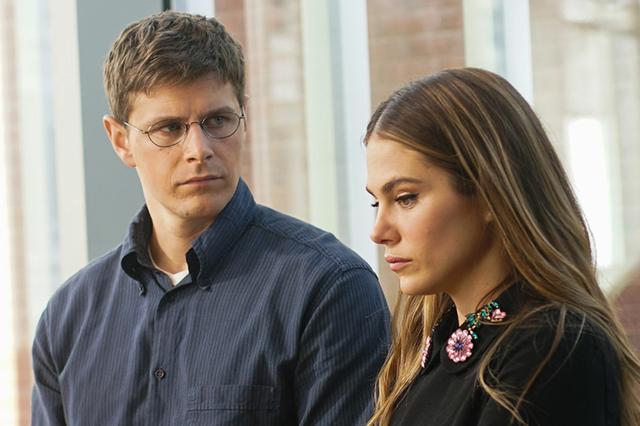Toronto Film Festival: ‘The Fall of the American Empire’
By Joe Leydon
LOS ANGELES (Variety.com) – Charged with alternating currents of droll wit, sardonic cynicism, and socialist-tinged idealism, writer-director Denys Arcand’s “The Fall of the American Empire” is a richly amusing rumination on the excesses and amorality of capitalism that plays like an ingeniously contrived mashup of film noir melodrama and Ealing Studios comedy. Despite the title, the new film has nothing to do with “The Decline of the American Empire,” Arcand’s classic 1986 roundelay about the lusty lives and endless conversations of eight self-regarding French Canadian intellectuals. But it does share at least a few thematic threads with that movie’s Oscar-winning sequel, “The Barbarian Invasions” (2003), which suggested that, in times of crisis, even a die-hard socialist might appreciate the value of having a great deal of money at his disposal.
Of course, you don’t have to have seen either of those earlier works to enjoy “Fall of the American Empire.” It’s very much a stand-alone work, focused on such contemporary concerns as the ever-expanding divide between the wealthy and the wretched (specifically in Montreal, but by extension everywhere), the shameless methods employed by the wealthy to hide their holdings in a labyrinth of foreign exchanges, the straining of social safety nets, and the corruption and/or incompetence of police, political leaders, and other defenders of the status quo.
On the other hand, longtime Arcand admirers may be fascinated by the subtle ways his latest effort ties in with some of his previous films — including, unexpectedly, “Jesus of Montreal” (1989), in which a modern-day Christ figure finds new ways to restore eyesight to the blind and life to the near-dead.
It’s difficult at first to warm to this film’s would-be savior, Pierre-Paul Daoust (Alexandre Landry), who’s introduced as a self-pitying malcontent railing against the “stupidity” of anyone and everyone who’s ever accomplished more than a well-educated individual such as himself. (Asked to explain the election of Donald Trump, he snaps: “Imbeciles worship cretins.”) When he mentions that he’s never had a serious romantic relationship, well, it’s easy to believe him. And when he complains that, despite having a Ph.D. in philosophy, he’s underemployed as a driver for a Montreal courier service, you can’t help wondering how unappealing he came across during interviews for other jobs.
Still, it’s clear from his generosity to homeless people — he gives money to panhandlers and volunteers at a soup kitchen — that Pierre-Paul’s heart is in the right place. And he greatly benefits from being in the wrong place at the right time when, while on his delivery rounds, he shows up during a robbery at a store where mob money is deposited in a back-room safe. After the shooting stops but before the police arrive, Pierre-Paul is the only one capable of snatching two duffel bags stuffed with cash. So he grabs the loot and tosses it into his truck.
All of which may sound like the setup for a typical film noir about a guy who pays dearly for a step out of line, and is prodded further down the primrose path by bad companions. That impression is reinforced by the introduction of two other key characters: Aspaine (Maripier Morin), a slinky call girl Pierre-Paul calls primarily because her online ad sports a quote from Racine — yes, he’s that snobbish — and almost immediately embraces her as a sweetheart and close confidant; and Sylvain (frequent Arcand collaborator Remy Girard), a burly biker who studied high finance during a just-ended prison stretch, and is understandably dubious when he’s approached for “investment” advice by a philosopher-quoting naif with a problematically huge stash of cash.
Here and there, Arcand acknowledges the noirish strains in his storyline with wink-wink, nudge-nudge humor — especially when Aspaine and Sylvain first meet and size each other up as archetypes — and sporadic outbursts of deadly serious, even shocking violence. Gradually, however, the traditional melodrama elements are overshadowed — even while Pierre-Paul continues to be trailed by two suspicious cops (Louis Morissette, Maxim Roy) with their own character quirks — as “Fall of the American Empire” emerges as a parable about doing the wrong things for the right reasons in a world so corrupt that even would-be saints and seriously tarnished angels can profit (materially as well as spiritually) from being sinners.
As is often the case, it all boils down to having friends in the right places. In this case, the three lead characters come to rely on Wilbrod Taschereau (Pierre Curzi), a highly respected and utterly unscrupulous financial wheeler-dealer who just happens to be one of Aspaine’s former clients. In a handful of scenes that depict Taschereau’s practiced mastery of hard-to-trace methods for moving money hither and yon across continents, Curzi effortlessly seizes control of the movie so confidently, he appears poised to simply tuck it into a pocket of his elegantly tailored sit and walk away with it. A nice touch: The normally curmudgeonly Sylvain is genuinely impressed to meet Taschereau because he studied about him in finance courses, and recognized him as a soul mate.
Arcand stumbles a bit as he approaches the finish line, and “Fall of the American Empire” evinces signs that he was hard-pressed to find fully satisfying ways to tie up all of his plot threads. (The fate of one character, while inarguably justified, seems a bit harsh under the circumstances.) And Arcand tries a little too hard at the very end to demonstrate his deep-down earnestness. But never mind: The performances across the board are everything they need to be, and the satirical thrusts are well aimed at the right targets. Better still, possibilities for redemption (or something like it) are intelligently introduced and cleverly realized with nary a dab of sentimentality.

